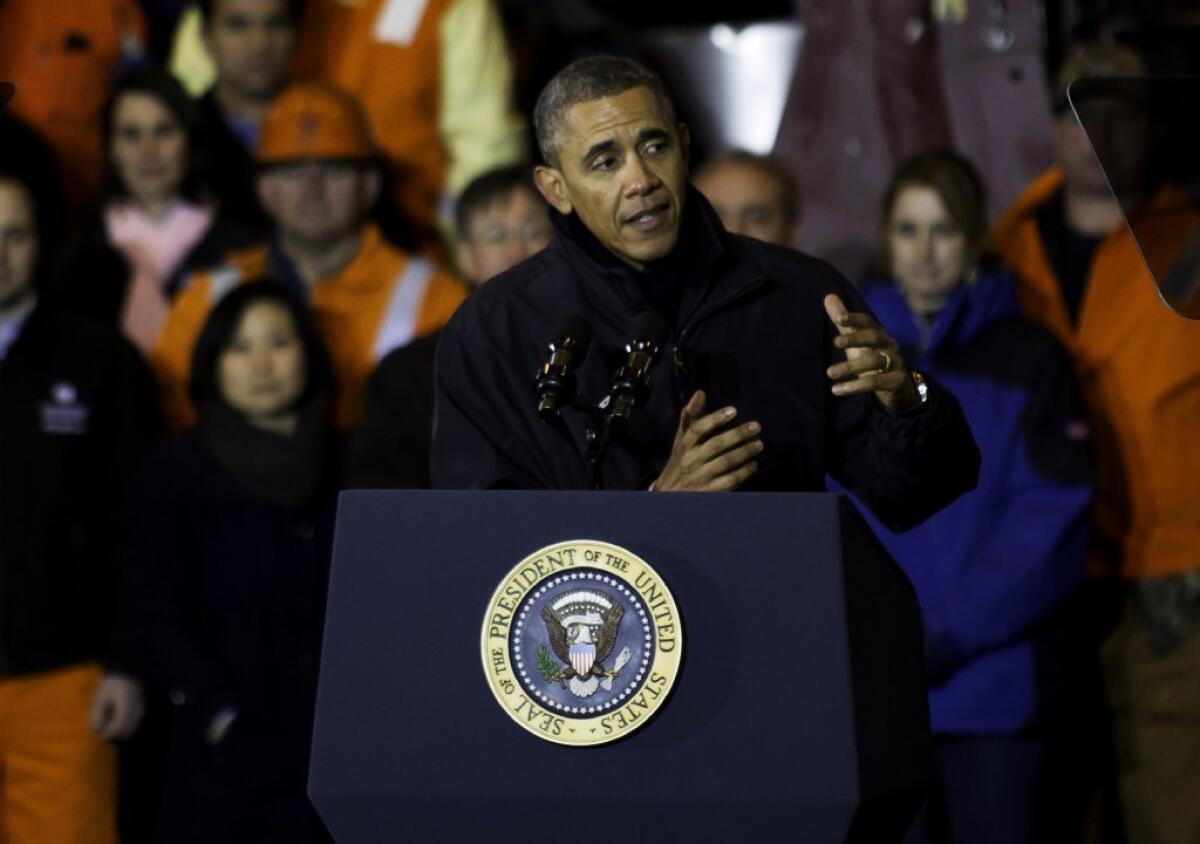Obama’s myRA: A good start, but not enough for retirement security

- Share via
Retirement experts nationwide are buzzing about one element of President Obama’s State of the Union speech Tuesday night. That’s his proposal for the “myRA,” a retirement account aimed chiefly at lower-income workers whose employers don’t offer traditional defined-contribution plans such as 401k’s.
In many respects the myRA is a welcome idea. But if Obama’s goal is to distract policy-makers from more substantial proposals to shore up the American retirement crisis--by expanding Social Security, for example--then it won’t cut the mustard.
The plan, as the President outlined it in his address and the White House fleshed out a bit more Wednesday, aims to give lower-income workers a way to start building retirement nest eggs in tax-deferred accounts, through regular payroll deductions made by their employers. The employers would have to agree to offer the service to employees.
The accounts would be available to those earning less than $191,000, but the minimum initial contribution would be $25 and subsequent contributions could be as little as $5.
The money would be invested in a government-backed bond with a yield pegged to the Government Securities Investment Fund offered to federal employees through the government’s Thrift Savings Plan, a retirement program. That low-risk, low-return fund yielded 1.47% over the last year and an average 2.24% over the last three years. Like Series EE savings bonds, the myRA bonds wouldn’t lose face value, which means the investments would be protected from market losses. But with such low yields they might barely keep up with inflation.
Once the accounts reach $15,000 in value, they would have to be rolled over into a conventional Individual Investment Account. That’s a sop to the financial services industry, which makes billions from managing IRAS. And that’s bad news, says economist Monique Morrissey of the Economic Policy Institute. “The president’s plan may serve to channel more savings into a high-risk, high-fee system without first addressing its failings,” she wrote on EPI’s blog.
If the myRA’s resemble Roth IRAs, then money invested in them wouldn’t be tax deductible, but in most cases distributions would be tax-exempt. The White House says myRA funds could be withdrawn at any time. That may make them more palatable for low-income workers because their contributions wouldn’t be tied up until retirement. But it might also encourage people to withdraw money for emergencies or household needs such as college tuition, medical bills or home purchases, which defeats the purpose of having a dedicated retirement account.
The proposal complements one that Obama has pushed before, most recently in his 2013 budget, for an “auto-IRA”--a mandate that small businesses without any other retirement benefits offer workers a simple individual retirement account and sign them up automatically unless they opt out. That program would require congressional approval, which hasn’t been forthcoming.
The problem with these proposals is that they’re only token solutions to the retirement income gap.
“Instead of putting forward the MyRA proposal and making some noises about auto-IRAs,” says Eric Kingson, a founding co-director of the advocacy organization Social Security Works, “I wish the president simply focused on the facts about the impending retirement income crisis, or acknowledged, along with his MyRA and auto-IRA rhetoric, that these proposals can, at best, only make a small dent in the larger problem.”
The myRA resembles, at least in its goals, a program devised by California State Sen. Kevin De Leon (D-Los Angeles) for “California Secure Choice.” That’s a state-sponsored retirement account for low-income workers funded from their paychecks and guaranteed a modest annual yield. The program has been endorsed in principle by the state legislature and Gov. Jerry Brown, and De Leon is in the process of developing a feasibility study to determine its features.
A retirement crisis is looming for millions of Americans. Most households haven’t saved enough to keep them secure through their retirement years; they’ll be relying heavily on Social Security. That’s why support is growing in Congress--albeit from a small kernel--to raise Social Security benefits, an idea being pushed vigorously by Democratic Sens. Elizabeth Warren of Massachusetts and Tom Harkin of Iowa. Harkin also is expected to release a new proposal for a government-sponsored retirement fund as early as Thursday.
President Obama’s plan is a good start at facing up to the financial crisis facing millions of American retirees and near-retirees. But leaving things at “a good start” isn’t going to be much help to very many people.
More to Read
Inside the business of entertainment
The Wide Shot brings you news, analysis and insights on everything from streaming wars to production — and what it all means for the future.
You may occasionally receive promotional content from the Los Angeles Times.











